
Myelodysplastic Syndromes
Latest News
Latest Videos

More News

Genetic testing for hereditary cancer unexpectedly uncovers a case of myelodysplastic syndrome (MDS), highlighting the need for careful interpretation of results and multidisciplinary collaboration.

Luspatercept showed real-world efficacy among patients with lower-risk myelodysplastic syndrome (MDS), confirming results seen in clinical trials.

The addition of bexmarilimab to azacitidine elicited an ORR of 63% among patients with relapsed/refractory higher-risk myelodysplastic syndrome.
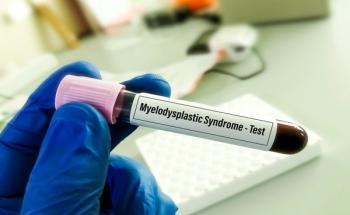
Infection was a leading cause of death in lower-risk myelodysplastic syndromes (MDS), highlighting the need for vigilant monitoring and preventive strategies.

Adding venetoclax to decitabine-cedazuridine significantly enhanced response rates in patients with higher-risk myelodysplastic syndromes (MDS) and chronic myelomonocytic leukemia.

Orca-T showed lower rates of graft-vs-host disease or infection compared with allogeneic hematopoietic stem cell transplantation for myelodysplastic syndrome (MDS) or acute leukemias in the Precision-T trial, Caspian Oliai, MD, MS, UCLA Bone Marrow Transplantation Stem Cell Processing Center, said.
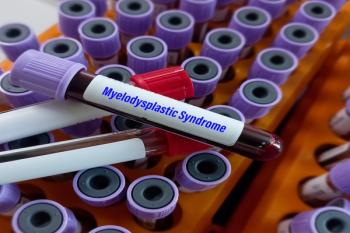
Erythropoiesis-stimulating agent (ESA) treatment before or early after regular transfusion therapy improved overall survival (OS) In lower-risk myelodysplastic syndromes (MDS), a new study found.

The European LeukemiaNet (ELN) scoring system showed similar results to the more complicated Integrated Flow Score (iFS) for diagnosing myelodysplastic syndrome (MDS), including in low-risk patients.

The rate of cGVHD-free survival was 78% at 1 year in patients who received Orca-T compared with 38% among patients who received standard allogeneic stem cell transplant for hematologic malignancies.
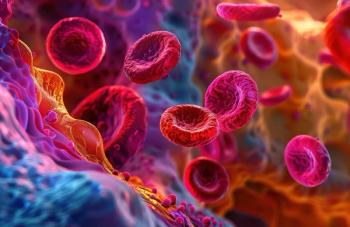
The new findings are the first to describe distributions and perturbations of low-density granulocyte and normal-density neutrophil subsets in myelodysplastic syndromes (MDS), acute myeloid leukemia (AML), and idiopathic cytopenia of unknown significance.

The next-generation sequencing (NGS)–based AlloHeme test accurately predicted relapse following allogeneic hematopoietic stem cell transplantation (allo-HSCT) in acute myeloid leukemia (AML) and myelodysplastic syndromes (MDS).

The FDA approved Amneal Pharmaceuticals' generic lenalidomide capsules, referencing Celgene's Revlimid, in multiple strengths.

Patients with myelodysplastic syndromes (MDS) who undergo allogeneic hematopoietic stem cell transplantation (allo-HSCT) are older and face worse outcomes compared with non-MDS patients, according to posters presented at the 2024 American Society of Hematology meeting.

The FDA approved treosulfan in combination with fludarabine as preparation for allogeneic hematopoietic stem cell transplantation (allo-HSCT) in adult and pediatric patients with acute myeloid leukemia (AML) or myelodysplastic syndrome (MDS).
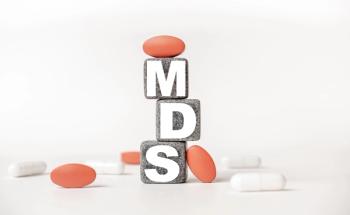
Two abstracts presented at the 2024 American Society of Hematology Annual Meeting & Exhibition provided insight into MDS response to hypomethylating agents (HMAs).

The study demonstrated a poor prognosis overall for patients with acute myeloid leukemia (AML) who were previously treated with hypomethylating agents (HMAs) for myeloid neoplasms such as myelodysplastic syndromes.

A pair of abstracts presented at the 2024 American Society of Hematology (ASH) Annual Meeting & Exhibition suggest that IDH1-targeted treatment may improve survival among patients with myelodysplastic syndromes (MDS) with the mutation.

A study demonstrated that pre-transplant measurable residual disease (MRD) status is a strong prognostic factor for overall survival, disease-free survival, and relapse risk in patients with AML and MDS undergoing allogeneic stem cell transplantation.

Nicole Grieselhuber, MD, PhD, of The Ohio State University, discusses results from Part D of a dosing study involving patients with previously untreated higher-risk myelodysplastic syndrome (MDS) who were treated with a combination of SEA-CD70 and azacitidine.
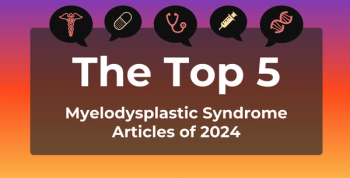
This year’s most-viewed articles and videos on myelodysplastic syndromes (MDS) explored patient quality of life, risk factors for progression, and more.

Findings from a phase 2 trial show that luspatercept effectively improves anemia in patients with lower-risk myelodysplastic syndromes (MDS), enabling them to delay or prevent transfusion dependence while maintaining a favorable safety profile.

Conventional parameters for risk stratification prognosis for patients with low-risk myelodysplastic neoplasms, especially bone marrow blast percentage, drop their clinical significance once molecular lesions are included in prognostic scores.

The recommendations for surveillance account for newly identified hematopoietic malignancy predispositions (HMP) and HMP genes, as well as a greater understanding of the prevalence of germline variants putting children as an increased risk of MDS and other HMs.

High cumulative doses of epipodophyllotoxins were associated with the highest risk for survivors of childhood cancer of developing late subsequent leukemia.

The single-center report showed the therapy had a favorable safety profile and manageable side effects in children with relapsed or refractory (R/R) acute myeloid leukemia (AML) or myelodysplastic syndromes (MDS).














